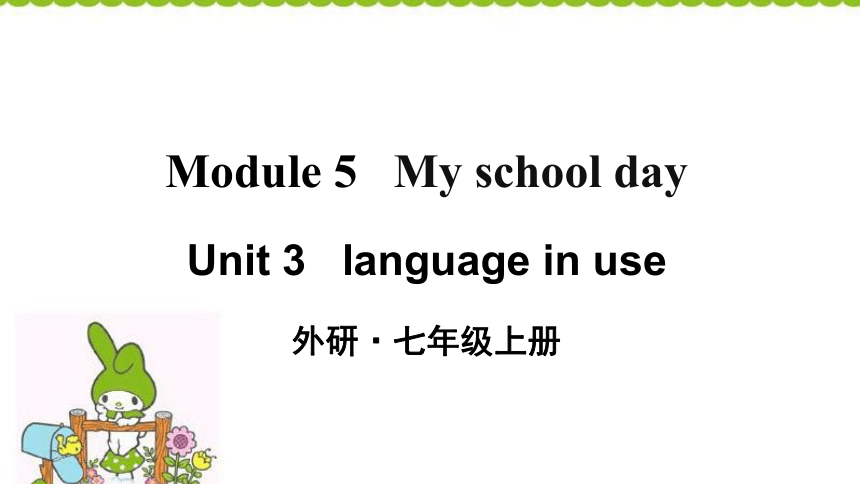
外研·七年级上册 Unit 3 language in use Module 5 My school day Language practice We have Chinese at eight o’clock. We don’t have maths. Do you like maths? Yes, I do. In the evening, I watch TV and have dinner with my family. (1)表示经常或习惯性的动作。 我们在学校吃午饭。 We have lunch at school. 一般现在时态(一) 1.用法: (2)表示主语具备的性格或能力、爱好等。 他们喜欢(吃)面条。 They like noodles. 我们说汉语。 We speak Chinese. (3)表示普遍真理或客观事实。 地球围绕着太阳转。 The earth moves around the sun. 2.一般现在时的肯定句、否定句和一般疑问句 的构成。(主语为 I, we, you, they 或名词复数): ①肯定式:主语+动词原形+其他. 我们/我/你(们)/他们七点半去上学。 We/I/You/They go to school at 7:30. ②否定式:主语+ don’t +动词原形+其他. ③一般疑问句: Do +主语+动词原形+其他? 肯定回答: Yes, 主语+ do. 否定回答: No, 主语+ don’t. ———你喜欢历史吗? ———是的,我喜欢。/不,我不喜欢。 —Do you like history? —Yes, I do. / No, I don’t. 3.一般现在时的特殊疑问句,由 “特殊疑问词+ do +主语+动词原形+其他?” 构成。 你什么时候起床? When do you get up? 你什么时间去上学? What time do you go to school? 4.一般现在时的动词常与 often, usually, always, sometimes, every day, once a week, never, on Sundays等频度副 词和具体的时间状语连用。 我每天六点起床。 I get up at six every day. 我经常九点钟上床睡觉。 I often go to bed at nine o’clock. 我有时在周六和我的弟弟一起踢足球。 I sometimes play football with my brother on Saturday. [注意] do 除用作助动词之外,还可用作行为动词,意为“做”。将含有 do one’s homework,do housework 等短语的肯定句变为否定句时,不能在原句谓语动词后直接加 not,而是应在 do 前加 don’t。 我晚上做我的家庭作业。 I do homework in the evening. 我不在晚上做我的家庭作业。 I don’t do my homework in the evening. 1 Talk about your activities in a week. I don’t go to school on Sunday. I go to the park on Sunday. I _____. I _____. 2 Match the words in Column A with the words and expressions in Column B. We often use have, do and go in English. Make notes of all the expressions you hear or see: have breakfast, do exercise, go swimming. Learning to learn B a) dinner b) your homework c) to school d) a break e) an English lesson f) to bed g) home 1 have 2 do 3 go A Now talk about your school day. I go to school at half past seven in the morning. I _____. I _____. 3 Complete the passage with the expressions from the box. do homework get up go to school have a break have breakfast have lunch start work On Friday I have a busy day. I (1) _____ at half past six in the morning. get up do homework get up go to school have a break have breakfast have lunch start work Then I wash my hands and face, and (2) _____ at seven. At half past seven, I (3) _____, and (4) _____ at eight. There are four lessons in the morning. have breakfast go to school start work At twenty to ten, we (5) _____ for twenty minutes. We go to the playground and I talk with my friends. We (6) _____ in the school dining hall. do homework get up go to school have a break have breakfast have lunch start w ... ...
~~ 您好,已阅读到文档的结尾了 ~~